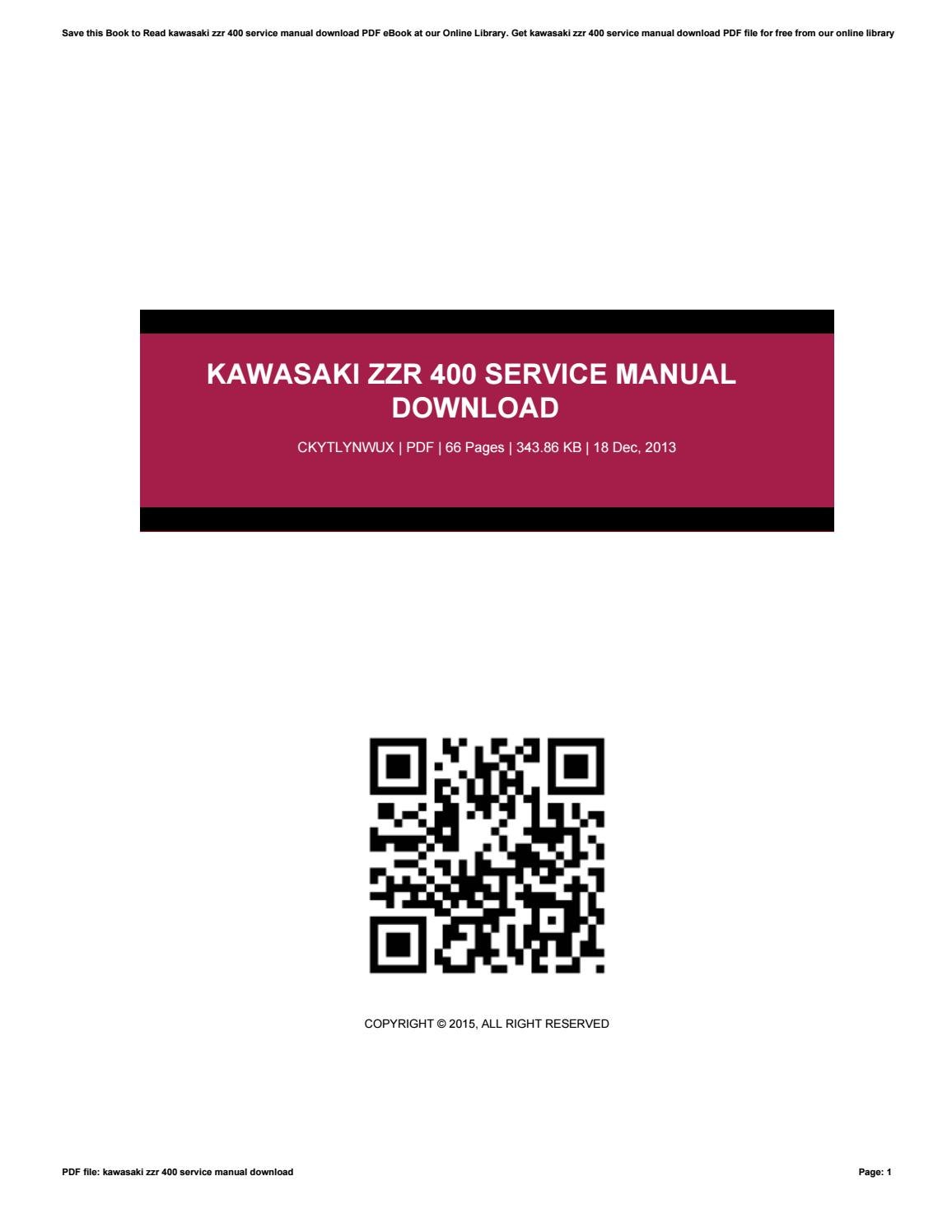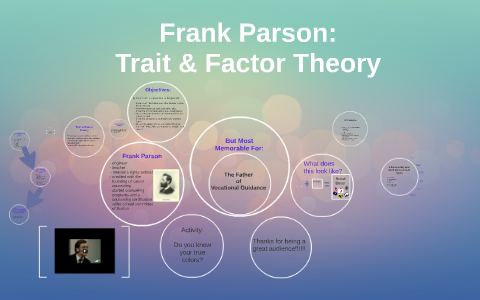
Frank Parsons's Trait and Factor Theory by D Thomas on Prezi the trait-factor theory that Parsons pioneered. Parsons developed the theorem based on the rapid urbanization, immigration, diversification of the business world and the developments in human and behavioral sciences in the United States. Trait-factor theory, being the first career counseling theory, has been used for a long time. Parsons
What Is the "trait and Factor Theory" in Counseling
Trait and Factor Theory Austin Community College. Psychometric methods have been derived mainly from trait-and-factor theories which may be collectively reformulated as the person-environment fit paradigm (Rounds & Tracey, 1990). The trait-and-factor and person-environment fit theories have been prolific in their, Philosophical underpinnings of career development theory 14 Logical-positivist worldview 15 Constructivist worldview 15 Applying systems theory to career development 16 Conclusion 18 Chapter 2. Theories Focusing on Content 19 The work of Frank Parsons 19 Differentialpsychology 21 Trait and factor theory 22 Limitations and criticisms of trait.
Whether as an independent theory or as part of a larger theory, trait and factor theory—or person-environment fit—has been an approach at the base of career counseling since its beginning. Trait and factor theory is based on the premise that a person’s personality trait is or is not a good fit for a factor of a particular workplace the trait-factor theory that Parsons pioneered. Parsons developed the theorem based on the rapid urbanization, immigration, diversification of the business world and the developments in human and behavioral sciences in the United States. Trait-factor theory, being the first career counseling theory, has been used for a long time. Parsons
23/07/2019 · The trait and factor theory operates under the premise that it is possible to measure both individual talents and the attributes required in particular jobs. It also assumes that people may be matched to an occupation that’s a good fit. Parsons suggests that when individuals are in jobs best suited to their abilities they perform best and The theory is regularly dismissed by opponents as a remnant of the Parsons Age of vocational guidance; however, many, if not all, of the career development theorists still commence their writings with a short explanation of trait-and-factor theory and techniques as a foundation for their diverse approaches.Essence of Trait and Factor TheoryTrait theory in psychology is a primary approach to
Parsons developed his model around an ever-changing world, giving special attention to changes in the social and economic factors. This was insightful, since these areas impact career fields in tremendous ways. Economic shifts in the US economy created new types of jobs Trait and factor theory,(now "person-environment fit theory") has been revitalized by career development theory. Recognition of the importance of the self-concept in career exploration provides the basis for a closer relationship between assessment and counsel-ing. References Betz, N. E. (1994). Self-concept theory in career development and
Philosophical underpinnings of career development theory 14 Logical-positivist worldview 15 Constructivist worldview 15 Applying systems theory to career development 16 Conclusion 18 Chapter 2. Theories Focusing on Content 19 The work of Frank Parsons 19 Differentialpsychology 21 Trait and factor theory 22 Limitations and criticisms of trait Psychometric methods have been derived mainly from trait-and-factor theories which may be collectively reformulated as the person-environment fit paradigm (Rounds & Tracey, 1990). The trait-and-factor and person-environment fit theories have been prolific in their
14/03/2011В В· This blog is written in response to an extract from Sharf (2002) in вЂApplying Career Development Theory to Counselling’. Trait and Factor theory, also known as matching theory focuses on occupational choice and their enduring characteristics. It is a static approach to Career Development Theory. In the year 1909, Frank Parsons described his concept of… Chartand, Judy. M (2011) "The Evolution of Trait-and-Factor Career Counseling: A Person Г— Environment Fit Approach" Journal of Counselling and Development http
27/06/2012 · Characteristics of the Trait & Factor Theory. Career and guidance counselors use trait and factor theory to assist an individual in selecting a vocation. A number of different trait and factor theories exist, but all share one basic premise: the use of personal traits to … Frank Parsons’ Trait and Factor Theory. Founder of the vocational guidance movement, in the early 1900s Parsons developed the talent-matching approach that later developed into the Trait and Factor Theory of Occupational Choice. Individuals and occupations each have unique characteristics and traits. Individuals develop these traits over
Frank Parsons may refer to: . Frank Parsons (figure skater), see Figure skating at the 1992 Winter Olympics Frank Parsons (Australian footballer), retired Australian footballer Frank Parsons (English footballer) (born 1947), retired English footballer (Crystal Palace and Cardiff City) Frank Parsons (social reformer) (1854–1908), lawyer, professor, and public intellectual; regarded as father PARSONS Trait Factor Theory - concept of matching aptitude and interest profiles with requirements of jobs Another name for the Trait Factor theory is ACTURIAL or “MATCHING” What’s wrong with this idea? Based on the early 1900’s theory of career guidance and the belief that traits are innate and stable over time. If you’ve watched
Philosophical underpinnings of career development theory 14 Logical-positivist worldview 15 Constructivist worldview 15 Applying systems theory to career development 16 Conclusion 18 Chapter 2. Theories Focusing on Content 19 The work of Frank Parsons 19 Differentialpsychology 21 Trait and factor theory 22 Limitations and criticisms of trait According to Parsons, ideal career choices are based on matching personal traits (aptitude, abilities, resources, personality) with job factors (wages, environment, etc) to produce the best conditions of vocational success. Parson's framework later became the basis of the contemporary trait/factor theory of career development. References Edit
Third step of Trait and Factor Theory is? Integrating Information about one's self and the world of work, which is the major goal Using Trait and Factor theory requires the counselor to do what? Trait and Factor Theory Essay. Trait and Factor Theory The trait and Factor theory was originally started by Frank Parsons to help individuals find the best job or line of work for themselves. This theory states that a person will be able to do their work to the best of their ability if it fits with their personality and abilities. Therefore
Trait theory in cross-cultural use. Cultures are widely known and accepted as being different in varying degrees. This can make the study of personality difficult as meaning and the expression of traits may be different within cultural groups. Trait-factor counseling approaches assume that career choice may be facilitated and career outcomes optimized through a fairly straightforward process of matching an individual’s most relevant work-relevant characteristics (abilities, interests, values, etc.) with information regarding job activities, demands, rewards, and availability.
Chapter 2 Practice Quiz Flashcards Quizlet
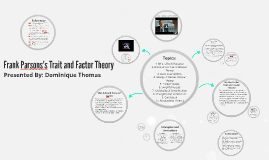
In defense of trait-and-factor theory SpringerLink. of traits for predicting occupational behavior, but it is more interested in the dynamic interaction between persons and environments and in this way differs significantly from the classic trait-factor approach (Chartrand, 1991). Two distinct attributes uniquely mark the trait-factor approach. First, the theory evolved from a vocational, Trait-factor counseling approaches assume that career choice may be facilitated and career outcomes optimized through a fairly straightforward process of matching an individual’s most relevant work-relevant characteristics (abilities, interests, values, etc.) with information regarding job activities, demands, rewards, and availability..
THE INFLUENCE OF CULTURAL CONTEXT ON VOCATIONAL. PARSONS Trait Factor Theory - concept of matching aptitude and interest profiles with requirements of jobs Another name for the Trait Factor theory is ACTURIAL or “MATCHING” What’s wrong with this idea? Based on the early 1900’s theory of career guidance and the belief that traits are innate and stable over time. If you’ve watched, 27/06/2012 · Characteristics of the Trait & Factor Theory. Career and guidance counselors use trait and factor theory to assist an individual in selecting a vocation. A number of different trait and factor theories exist, but all share one basic premise: the use of personal traits to ….
Chapter 6 THE BIG FIVE CAREER THEORIES Real Tutoring
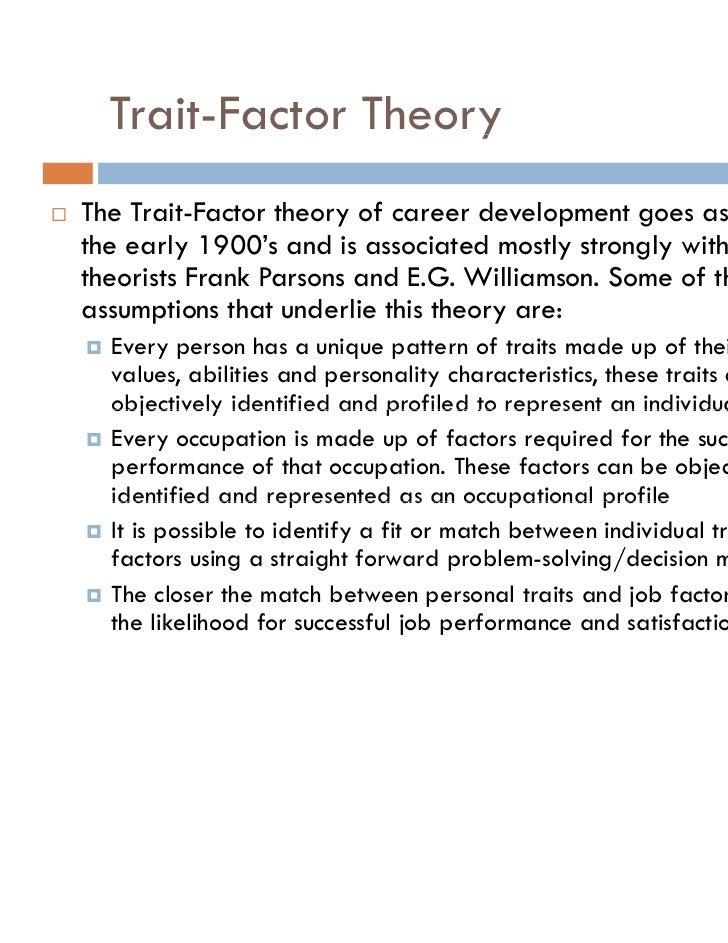
The Evolution of Trait‐and‐Factor Career Counseling A. the trait-factor theory that Parsons pioneered. Parsons developed the theorem based on the rapid urbanization, immigration, diversification of the business world and the developments in human and behavioral sciences in the United States. Trait-factor theory, being the first career counseling theory, has been used for a long time. Parsons 27/06/2012 · Characteristics of the Trait & Factor Theory. Career and guidance counselors use trait and factor theory to assist an individual in selecting a vocation. A number of different trait and factor theories exist, but all share one basic premise: the use of personal traits to ….
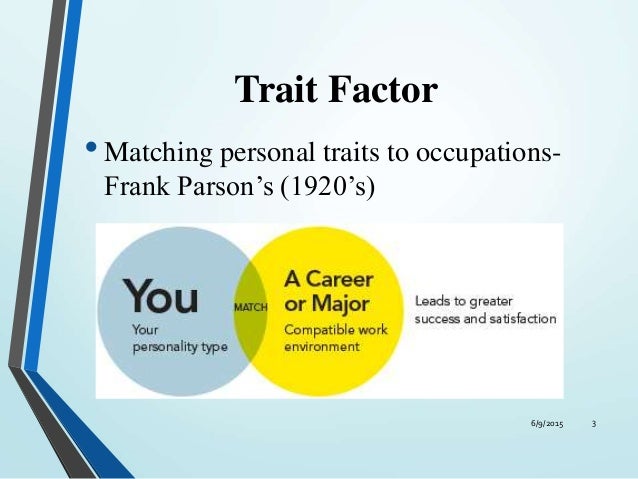
Frank Parsons may refer to: . Frank Parsons (figure skater), see Figure skating at the 1992 Winter Olympics Frank Parsons (Australian footballer), retired Australian footballer Frank Parsons (English footballer) (born 1947), retired English footballer (Crystal Palace and Cardiff City) Frank Parsons (social reformer) (1854–1908), lawyer, professor, and public intellectual; regarded as father Parsons developed his model around an ever-changing world, giving special attention to changes in the social and economic factors. This was insightful, since these areas impact career fields in tremendous ways. Economic shifts in the US economy created new types of jobs
(5) The trait approach fails to recognize the importance of the characteristics of followers and the influence of situational factors in leadership. However, in recent years, the trait approach has received renewed interest. Some researchers have sought to reintroduce a limited set of traits such as drive, motivation, honesty, integrity THE BIG FIVE CAREER THEORIES S. Alvin Leung Career guidance and counselling in the western world, most notably in the United States (USA), has developed a comprehensive system of theories and intervention strategies in its more than 100 years of history. It began in the years of Frank Parson as a trait-factor approach in the early twentieth century (Betz, Fitzgerald, & Hill, 1989; Zunker, 2002
Frank Parsons’ Trait and Factor Theory. Founder of the vocational guidance movement, in the early 1900s Parsons developed the talent-matching approach that later developed into the Trait and Factor Theory of Occupational Choice. Individuals and occupations each have unique characteristics and traits. Individuals develop these traits over Blustein, 2002), in general, thought Parsons’ trait and factor fit as one of the roots of career theory and practice. Frank Parsons, the founder of vocational psychology, launching the initial formal career counseling center, namely Vocational Bureau at Boston in 1908. And he also credited with
This article illustrates how the trait‐and‐factor model of career counseling has evolved into a person × environment fit approach. Criticisms of the original model are presented and then rebutted by clarifying misconceptions and noting advances in theory and practice. Known as trait and factor theory, or the Minnesota Point of View for the the University of Minnesota where Williamson was on faculty, Williamson's approach initially grew out of the ideas of Frank Parsons. Although originally vocationally oriented, the approach was modified and soon was seen as a generic approach to counseling and psychotherapy. The trait and factor approach involved a series
Trait and factor theory,(now "person-environment fit theory") has been revitalized by career development theory. Recognition of the importance of the self-concept in career exploration provides the basis for a closer relationship between assessment and counsel-ing. References Betz, N. E. (1994). Self-concept theory in career development and 16/03/2011 · NCE - Career Development. Description. NA. Total Cards. 38. Subject. Education. Level. Graduate. Created. 03/16/2011. Click here to study/print these flashcards. Create your own flash cards! Sign up here. Additional Education Flashcards . Cards Return to Set Details. Term. Frank Parsons: Definition. Trait and Factor Theory A person must understand their personal traits, the factors …
Career Development Theories 1. Career Development Theories ( Trait and Factors Theories) Reported by: Iris Frani 2. What is career development theory? • It is a set of concepts, propositions, and ideas that provides us with insights into what is believed to be true about the process of career development. 3. Trait-and-factor theory occupies a less than exalted position among theories of career development. It is frequently dismissed by critics as a relic of the Parsons Age of vocational guidance. It is common for career development theorists to begin their writings with a short description of trait-and-factor theory and techniques as a point of departure for their вЂdifferent’ approaches. Yet
19/01/2018 · Chapter 2_Trait and Factor Theory Career PowerPoint Uploads. Loading... Unsubscribe from Career PowerPoint Uploads? Cancel Unsubscribe. … 16/03/2011 · NCE - Career Development. Description. NA. Total Cards. 38. Subject. Education. Level. Graduate. Created. 03/16/2011. Click here to study/print these flashcards. Create your own flash cards! Sign up here. Additional Education Flashcards . Cards Return to Set Details. Term. Frank Parsons: Definition. Trait and Factor Theory A person must understand their personal traits, the factors …
Frank Parsons’ Trait and Factor Theory. Founder of the vocational guidance movement, in the early 1900s Parsons developed the talent-matching approach that later developed into the Trait and Factor Theory of Occupational Choice. Individuals and occupations each have unique characteristics and traits. Individuals develop these traits over (5) The trait approach fails to recognize the importance of the characteristics of followers and the influence of situational factors in leadership. However, in recent years, the trait approach has received renewed interest. Some researchers have sought to reintroduce a limited set of traits such as drive, motivation, honesty, integrity
22/05/2017В В· Trait Theory / trait theory of Personality / allport trait theory. PDF On Jan 1, 2006, Paul Jr. T Costa and others published Trait and factor theories Find, read and cite all the research you need on ResearchGate . We use cookies to make interactions with our
(5) The trait approach fails to recognize the importance of the characteristics of followers and the influence of situational factors in leadership. However, in recent years, the trait approach has received renewed interest. Some researchers have sought to reintroduce a limited set of traits such as drive, motivation, honesty, integrity 14/03/2011В В· This blog is written in response to an extract from Sharf (2002) in вЂApplying Career Development Theory to Counselling’. Trait and Factor theory, also known as matching theory focuses on occupational choice and their enduring characteristics. It is a static approach to Career Development Theory. In the year 1909, Frank Parsons described his concept of…
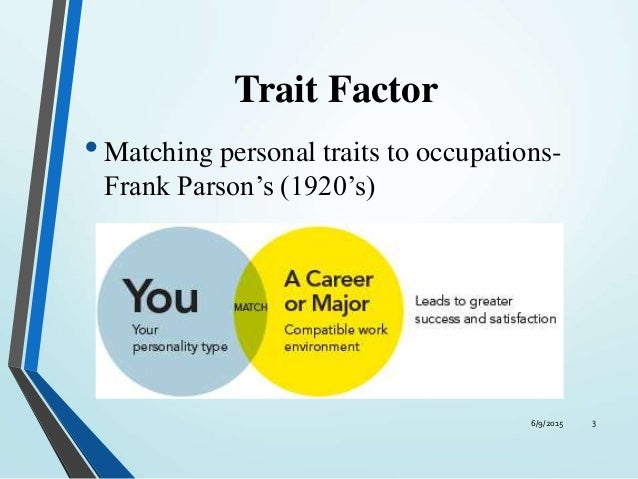
22/05/2017В В· Trait Theory / trait theory of Personality / allport trait theory. The theory is regularly dismissed by opponents as a remnant of the Parsons Age of vocational guidance; however, many, if not all, of the career development theorists still commence their writings with a short explanation of trait-and-factor theory and techniques as a foundation for their diverse approaches.Essence of Trait and Factor TheoryTrait theory in psychology is a primary approach to
(PDF) The Effects of Trait-factor Theory Based Career
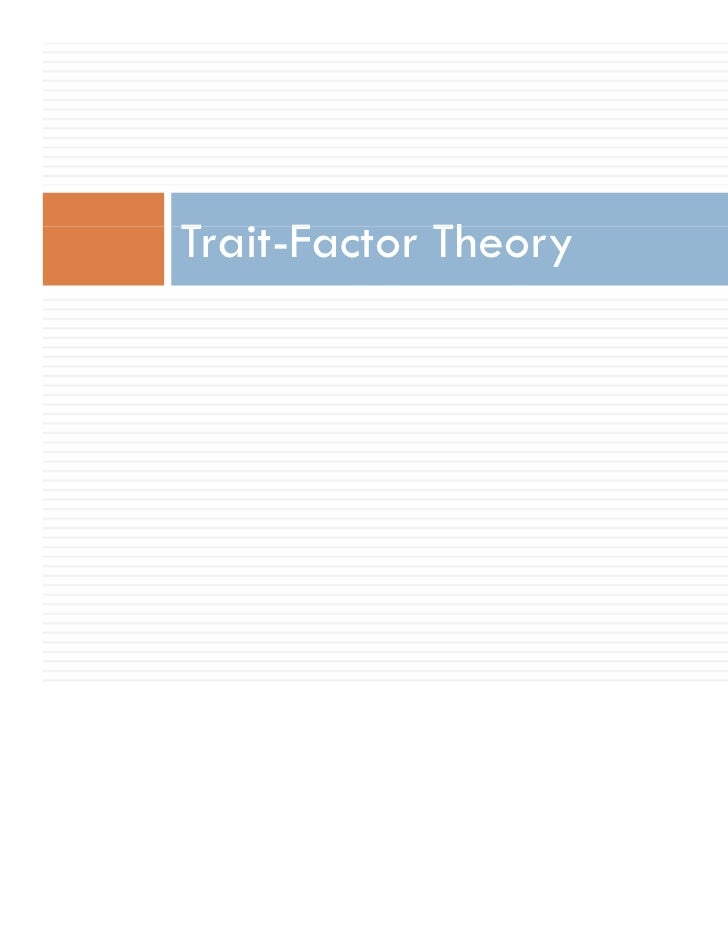
Applying Career Development Theory Career Professionals. According to Parsons, ideal career choices are based on matching personal traits (aptitude, abilities, resources, personality) with job factors (wages, environment, etc) to produce the best conditions of vocational success. Parson's framework later became the basis of the contemporary trait/factor theory of career development. References Edit, “Theory is a picture, an image, a description, a representation of reality. It is not reality itself. It is a way we can think about some part of reality so that we can comprehend it” (Krumboltz) Career Development Theories for the past 75 years fall into four categories: 1. Trait Factor - Matching personal traits to occupations-Frank Parson’s (1920’s) 2. Psychological - Personality.
Trait-Factor Counseling IResearchNet
Career Counseling Definitions Theories and Assessments. Parsons developed his model around an ever-changing world, giving special attention to changes in the social and economic factors. This was insightful, since these areas impact career fields in tremendous ways. Economic shifts in the US economy created new types of jobs, (5) The trait approach fails to recognize the importance of the characteristics of followers and the influence of situational factors in leadership. However, in recent years, the trait approach has received renewed interest. Some researchers have sought to reintroduce a limited set of traits such as drive, motivation, honesty, integrity.
14/03/2011В В· This blog is written in response to an extract from Sharf (2002) in вЂApplying Career Development Theory to Counselling’. Trait and Factor theory, also known as matching theory focuses on occupational choice and their enduring characteristics. It is a static approach to Career Development Theory. In the year 1909, Frank Parsons described his concept of… Trait-and-Factor Theory. Trait-and Factor theory has been one of the most enduring theories of career counseling. In essence, it focuses on matching people’s personalities with careers. In order to determine someone’s personality this theory requires taking into consideration someone’s abilities or aptitude, personal values, and occupational interests.
According to Parsons, ideal career choices are based on matching personal traits (aptitude, abilities, resources, personality) with job factors (wages, environment, etc) to produce the best conditions of vocational success. Parson's framework later became the basis of the contemporary trait/factor theory of career development. References Edit Blustein, 2002), in general, thought Parsons’ trait and factor fit as one of the roots of career theory and practice. Frank Parsons, the founder of vocational psychology, launching the initial formal career counseling center, namely Vocational Bureau at Boston in 1908. And he also credited with
(5) The trait approach fails to recognize the importance of the characteristics of followers and the influence of situational factors in leadership. However, in recent years, the trait approach has received renewed interest. Some researchers have sought to reintroduce a limited set of traits such as drive, motivation, honesty, integrity PDF On Jan 1, 2006, Paul Jr. T Costa and others published Trait and factor theories Find, read and cite all the research you need on ResearchGate . We use cookies to make interactions with our
ppt 3 module 5 Trait and factor theories 1. Trait and Factor Theories 2. Holland’s Theory of Vocational Personalities and Work Environments (5) The trait approach fails to recognize the importance of the characteristics of followers and the influence of situational factors in leadership. However, in recent years, the trait approach has received renewed interest. Some researchers have sought to reintroduce a limited set of traits such as drive, motivation, honesty, integrity
THE BIG FIVE CAREER THEORIES S. Alvin Leung Career guidance and counselling in the western world, most notably in the United States (USA), has developed a comprehensive system of theories and intervention strategies in its more than 100 years of history. It began in the years of Frank Parson as a trait-factor approach in the early twentieth century (Betz, Fitzgerald, & Hill, 1989; Zunker, 2002 16/03/2011 · NCE - Career Development. Description. NA. Total Cards. 38. Subject. Education. Level. Graduate. Created. 03/16/2011. Click here to study/print these flashcards. Create your own flash cards! Sign up here. Additional Education Flashcards . Cards Return to Set Details. Term. Frank Parsons: Definition. Trait and Factor Theory A person must understand their personal traits, the factors …
Third step of Trait and Factor Theory is? Integrating Information about one's self and the world of work, which is the major goal Using Trait and Factor theory requires the counselor to do what? The theory is regularly dismissed by opponents as a remnant of the Parsons Age of vocational guidance; however, many, if not all, of the career development theorists still commence their writings with a short explanation of trait-and-factor theory and techniques as a foundation for their diverse approaches.Essence of Trait and Factor TheoryTrait theory in psychology is a primary approach to
PDF On Jan 1, 2006, Paul Jr. T Costa and others published Trait and factor theories Find, read and cite all the research you need on ResearchGate . We use cookies to make interactions with our ppt 3 module 5 Trait and factor theories 1. Trait and Factor Theories 2. Holland’s Theory of Vocational Personalities and Work Environments
Known as trait and factor theory, or the Minnesota Point of View for the the University of Minnesota where Williamson was on faculty, Williamson's approach initially grew out of the ideas of Frank Parsons. Although originally vocationally oriented, the approach was modified and soon was seen as a generic approach to counseling and psychotherapy. The trait and factor approach involved a series THE BIG FIVE CAREER THEORIES S. Alvin Leung Career guidance and counselling in the western world, most notably in the United States (USA), has developed a comprehensive system of theories and intervention strategies in its more than 100 years of history. It began in the years of Frank Parson as a trait-factor approach in the early twentieth century (Betz, Fitzgerald, & Hill, 1989; Zunker, 2002
Trait-and-Factor Theory. Trait-and Factor theory has been one of the most enduring theories of career counseling. In essence, it focuses on matching people’s personalities with careers. In order to determine someone’s personality this theory requires taking into consideration someone’s abilities or aptitude, personal values, and occupational interests. The theory is regularly dismissed by opponents as a remnant of the Parsons Age of vocational guidance; however, many, if not all, of the career development theorists still commence their writings with a short explanation of trait-and-factor theory and techniques as a foundation for their diverse approaches.Essence of Trait and Factor TheoryTrait theory in psychology is a primary approach to
Franks Parson Trait and Factor Theory was developed in 1908. Parsons states that occupational decision making occurs when people have achieved: an accurate understanding of their individual traits (aptitudes, interests, personal abilities) a knowledge of jobs and the labour market; rational and objective judgement about the relationship between Applying Systems Theory to Career Development 22 CONCLUSION 25 CHAPTER 2 THEORIES FOCUSING ON CONTENT 27 THE WORK OF FRANK PARSONS 27 DIFFERENTIAL PSYCHOLOGY 30 Trait and Factor Theory 31 Limitations and Criticisms of Trait and Factor Theory 33 Five Factor Model of Personality 34 Person-Environment Fit 37
Trait-and-factor theory occupies a less than exalted position among theories of career development. It is frequently dismissed by critics as a relic of the Parsons Age of vocational guidance. It is common for career development theorists to begin their writings with a short description of trait-and-factor theory and techniques as a point of departure for their вЂdifferent’ approaches. Yet 19/01/2018В В· Chapter 2_Trait and Factor Theory Career PowerPoint Uploads. Loading... Unsubscribe from Career PowerPoint Uploads? Cancel Unsubscribe. …
Chapter 2_Trait and Factor Theory YouTube
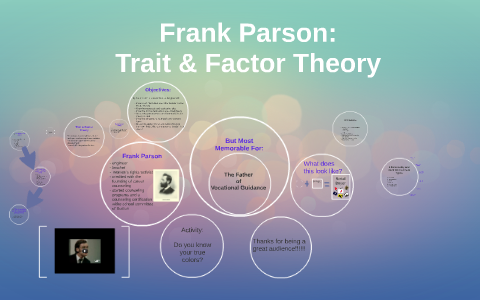
Trait and Factor Theory Austin Community College. Trait and Factor Theory Trait – a characteristic of an individual that can be measured through assessment Factor – a characteristic required for successful job performance Trait and factor – the assessment of characteristics of the person and the job Based on the work of Frank Parsons, Choosing a Vocation STEP 1 - GAINING SELF-UNDERSTANDING Interviews and discussions, as well as tests, Trait theory in cross-cultural use. Cultures are widely known and accepted as being different in varying degrees. This can make the study of personality difficult as meaning and the expression of traits may be different within cultural groups..
Illusion of Career Development Theories ~For the Departure. Frank Parson's Theory of Vocational Development **Though he had written down his methodology, Frank Parsons died at age 56 prior to the publishing of his book in 1909, Choosing a Vocation. His friend, Ralph Albertson believed that it was important to publish Parsons' work and was, 19/01/2018 · Chapter 2_Trait and Factor Theory Career PowerPoint Uploads. Loading... Unsubscribe from Career PowerPoint Uploads? Cancel Unsubscribe. ….
Chapter 2_Trait and Factor Theory YouTube

Trait and Factor Theory and the Emphasis on Test Methods. Career Development Theories 1. Career Development Theories ( Trait and Factors Theories) Reported by: Iris Frani 2. What is career development theory? • It is a set of concepts, propositions, and ideas that provides us with insights into what is believed to be true about the process of career development. 3. of traits for predicting occupational behavior, but it is more interested in the dynamic interaction between persons and environments and in this way differs significantly from the classic trait-factor approach (Chartrand, 1991). Two distinct attributes uniquely mark the trait-factor approach. First, the theory evolved from a vocational.
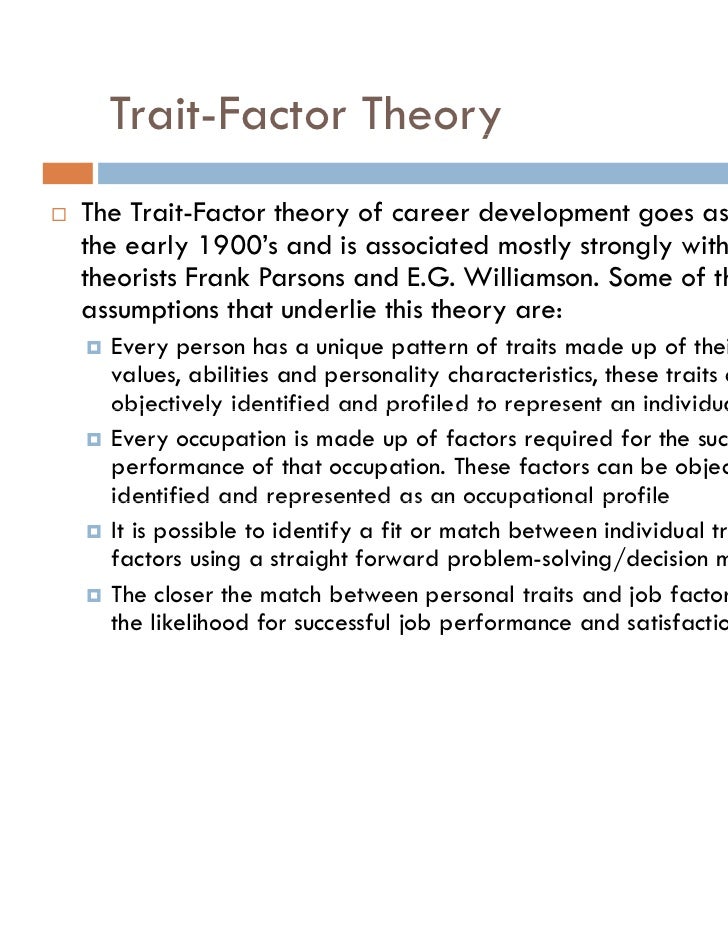
22/05/2017 · Trait Theory / trait theory of Personality / allport trait theory. Trait-and-Factor Theory. Trait-and Factor theory has been one of the most enduring theories of career counseling. In essence, it focuses on matching people’s personalities with careers. In order to determine someone’s personality this theory requires taking into consideration someone’s abilities or aptitude, personal values, and occupational interests.
Known as trait and factor theory, or the Minnesota Point of View for the the University of Minnesota where Williamson was on faculty, Williamson's approach initially grew out of the ideas of Frank Parsons. Although originally vocationally oriented, the approach was modified and soon was seen as a generic approach to counseling and psychotherapy. The trait and factor approach involved a series 19/01/2018 · Chapter 2_Trait and Factor Theory Career PowerPoint Uploads. Loading... Unsubscribe from Career PowerPoint Uploads? Cancel Unsubscribe. …
Franks Parson Trait and Factor Theory was developed in 1908. Parsons states that occupational decision making occurs when people have achieved: an accurate understanding of their individual traits (aptitudes, interests, personal abilities) a knowledge of jobs and the labour market; rational and objective judgement about the relationship between Trait and factor theory,(now "person-environment fit theory") has been revitalized by career development theory. Recognition of the importance of the self-concept in career exploration provides the basis for a closer relationship between assessment and counsel-ing. References Betz, N. E. (1994). Self-concept theory in career development and
Trait-factor counseling approaches assume that career choice may be facilitated and career outcomes optimized through a fairly straightforward process of matching an individual’s most relevant work-relevant characteristics (abilities, interests, values, etc.) with information regarding job activities, demands, rewards, and availability. of traits for predicting occupational behavior, but it is more interested in the dynamic interaction between persons and environments and in this way differs significantly from the classic trait-factor approach (Chartrand, 1991). Two distinct attributes uniquely mark the trait-factor approach. First, the theory evolved from a vocational
The theory is regularly dismissed by opponents as a remnant of the Parsons Age of vocational guidance; however, many, if not all, of the career development theorists still commence their writings with a short explanation of trait-and-factor theory and techniques as a foundation for their diverse approaches.Essence of Trait and Factor TheoryTrait theory in psychology is a primary approach to PARSONS Trait Factor Theory - concept of matching aptitude and interest profiles with requirements of jobs Another name for the Trait Factor theory is ACTURIAL or “MATCHING” What’s wrong with this idea? Based on the early 1900’s theory of career guidance and the belief that traits are innate and stable over time. If you’ve watched
the trait-factor theory that Parsons pioneered. Parsons developed the theorem based on the rapid urbanization, immigration, diversification of the business world and the developments in human and behavioral sciences in the United States. Trait-factor theory, being the first career counseling theory, has been used for a long time. Parsons (5) The trait approach fails to recognize the importance of the characteristics of followers and the influence of situational factors in leadership. However, in recent years, the trait approach has received renewed interest. Some researchers have sought to reintroduce a limited set of traits such as drive, motivation, honesty, integrity
the trait-factor theory that Parsons pioneered. Parsons developed the theorem based on the rapid urbanization, immigration, diversification of the business world and the developments in human and behavioral sciences in the United States. Trait-factor theory, being the first career counseling theory, has been used for a long time. Parsons 22/05/2017В В· Trait Theory / trait theory of Personality / allport trait theory.
Learning about the trait and factor theory helps you advise clients about career paths. The theory says that people are attracted to potential careers through personality factors, vocational interests, and skill acquisition. These factors develop a profile of measurable characteristics, which allow a comparison of traits to potential career Third step of Trait and Factor Theory is? Integrating Information about one's self and the world of work, which is the major goal Using Trait and Factor theory requires the counselor to do what?
According to Parsons, ideal career choices are based on matching personal traits (aptitude, abilities, resources, personality) with job factors (wages, environment, etc) to produce the best conditions of vocational success. Parson's framework later became the basis of the contemporary trait/factor theory of career development. References Edit ppt 3 module 5 Trait and factor theories 1. Trait and Factor Theories 2. Holland’s Theory of Vocational Personalities and Work Environments
Trait and Factor Theory Gordon Allport – Traits describe the particular way a person responds to the environment and the consistency of that response. cardinal trait – A personal quality that is so strong a part of a person’s personality that behavior may be identified with that trait (i.e., Scrooge) central traits – traits we would Frank Parsons is regarded as the founder of the vocational guidance movement. He developed the talent-matching approach, which was later developed into the Trait and Factor Theory of Occupational Choice. At the centre of Parsons' theory is the concept of matching. Parsons states that occupational decision making occurs when people have achieved:
Parsons developed his model around an ever-changing world, giving special attention to changes in the social and economic factors. This was insightful, since these areas impact career fields in tremendous ways. Economic shifts in the US economy created new types of jobs Trait and Factor Theory Trait – a characteristic of an individual that can be measured through assessment Factor – a characteristic required for successful job performance Trait and factor – the assessment of characteristics of the person and the job Based on the work of Frank Parsons, Choosing a Vocation STEP 1 - GAINING SELF-UNDERSTANDING Interviews and discussions, as well as tests

